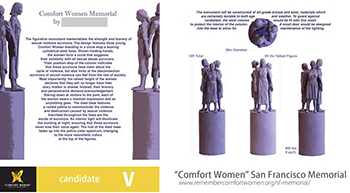
Japan’s subjugation of “comfort women,” during World War II has been a source of contention between Korea and Japan for a long time. Despite the solid evidence of the Japanese imperial government and military’s direct involvement in subjecting thousands of women and girls during the war, the Japanese have not yet given an acceptable apology. With the South Korean and Japanese governments’ “Comfort Women Agreement” failing to reach any of the requirements proposed by the victims, many who are concerned with the issue are continuously calling for its cancellation. There are people abroad who are also fighting for justice on this issue. Ewha Voice visited organizations in California, one of the most acknowledged multicultural states in the U.S. with a long legacy of pan-ethnic solidarity, to hear about their efforts and current projects to tell the stories of comfort women in the right way.
A multi-interest human rights coalition: CWJC
oalition: CWJC The Comfort Women Justice Coalition (CWJC) is a multiethnic coalition of 17 community based organizations, mainly throughout the San Francisco Bay area. CWJC was established in 2015 when the proposal to erect a memorial for “comfort women” in San Francisco was met with fierce opposition from history denialists, most of whom were Japanese. Although the CWJC movement initially emphasized the tragedy of “comfort women,” they have extended their objectives to a multi-interest human rights coalition. “The impacts of the denial of an unprecedented and heinous war crime of the 20th century still continues to this day in the Asian-Pacific region as a whole,” commented Miho Lee, a member of the CWJC. “The impact is not unique only to women and children in the region, but also on international peace and stability in regards to human rights.” From sustained struggles by numerous Asian-Americans who fought as immigrants for the collective right of people to learn the lawful history on their own terms, ethnic studies and disciplines bloomed in the Bay Area. As an extension of this movement, the CWJC is currently working to build a memorial in Saint Mary’s Square by September. Saint Mary’s Square, located in Chinatown among the bustling streets in the heart of downtown San Francisco, holds cultural and historical significance. Although the memorial proposals were successfully settled and are now on a smoother path, the process by which San Francisco became the first-ever major U.S. city to have a “comfort women” memorial took a long way around. Despite more than 200 emails in opposition sent to the Arts Commission, the commission in charge of approving the statue, plans for the memorial are now in action thanks to the support from people of various fields. Among over 30 proposed artworks, the one with a trio of girls holding hands and looked upon by a woman in traditional hanbok was chosen, along with a text that reads as follows. “This monument bears witness to the suffering of hundreds of thousands of women and girls euphemistically called ‘comfort women, ’who were sexually enslaved by the Japanese Imperial Armed Forces in 13 Asian-Pacific countries from 1931 to 1945. This memorial is dedicated to the memory of these women and to eradicating sexual violence and sex trafficking throughout the world.” The CWJC hopes for the memorial to function as a crucial anchor for the safety and justice of women and girls all over the world. Refusing to accept the narrative stating that campaigns to find justice for “comfort women” is merely a tactic to seek vengeance upon Japan, the CWJC continues its efforts on spreading the historical truth lawfully. “How the world deals with this particular issue will have enormous repercussions on how sexual violence during war times will be addressed and settled in terms of international crimes,” Lee emphasized. “I hope that more people will stand up in solidarity with ‘comfort women’ as it will allow us to take a principle stance against history denialism.”

